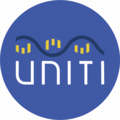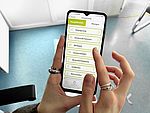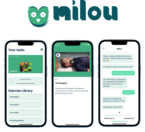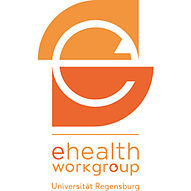
Projekte der AG E-Health
Projekte im Rahmen der UNITI-StudieEntwicklung einer Tinnitus Management App in Kooperation |
|
Ecological & momentary symptom dataDatenerfassung über die UNITI-App in Form eines Tinnitus-Tagebuchs mit täglichen Befragungen zu Tinnitus-Symptomen und generellem Befinden mit dem Ziel des Erfassens von Längsschnittdaten und möglicher Rückschlüsse über Erkrankungen und Symptome. |
Digitale Verhaltenstherapie mit SilentCloudDie SilentCloud App der Sonova AG ist eine Tinnitus-Management App mit den Schwerpunkten Psychodedukation, Internet-basierte kognitive Verhaltenstherapie sowie individualisierter Klangtherapie. Zur Evaluation der Wirksamkeit wird in Kooperation mit der Charté Berlin eine randomisiert-kontrollierte Studie mit N=120 durchgeführt. |
|
App-basiertes Trainingsprogramm bei somatischem Tinnitus mit der Milou AppBei somatischem Tinnitus wird ein Zusammenhang mit Funktionsstörungen der Halswirbelsäule und des Kiefergelenks vermutet. Durch ein 9-wöchiges chat-basiertes Trainingsprogramm mit der Milou App soll die Nacken- und Schultermuskulatur gestärkt werden. In einer Pilotstudie wurde dabei schon eine Verbesserung der Tinnitus-Belastung festgestellt (N=38). |
|
Internet-basierte transdiagnostische TherapieKonzept der Implementierung einer transdiagnostischen Psychotherapie für affektive Störungen (UP) als internet-basiertes Programm. In einer einarmigen Pilotstudie mit Tinnituspatienten (hohe Komorbidität mit affektiven Störungen) wurde eine Reduktion der Tinnitus-Belastung, jedoch keine Veränderung der Depressivität festgestellt (N=38). |
|
 Tinnitus Datenbank der Tinnitus Research Initiative (TRI)
Tinnitus Datenbank der Tinnitus Research Initiative (TRI)
Seit 2008 werden in einer internationalen Datenbank Daten von über 3000 Tinnituspatient*innen aus 11 Ländern gesammelt. Mehr als 40 Therapieanzsätze sind bereits dokumentiert. Ziel des Projekts ist es, mehr über Tinnitus-Symptome und deren optimale Therapie zu lernen und so die Lebensqualität der Patient*innen zu steigern.
PROWISS-Semester und medizinische Doktorarbeit
Bachelor- und Masterarbeit
Innerhalb der eHealth Arbeitsgruppe können Studierende sowohl im Sommer- als auch im Wintersemester ein PROWISS/Abschlussarbeits-Semester absolvieren. Studierende können in klinischen oder Grundlagenforschungsprojekten mitwirken und auf Basis dieser Tätigkeit eine medizinische Doktorarbeit oder Abschlussarbeit erstellen.
Die Arbeiten können hierbei definierte Fragestellungen im Rahmen einer laufenden Studie oder auch retrospektive Analysen zu bereits abgeschlossenen Erhebungen betreffen. Eine engmaschige Betreuung und Unterstützung wird gewährleistet, eigenverantwortliches und selbstständiges Arbeiten wird erwartet. Bei Interesse gerne per Mail melden bei milena.engelke@ukr.de.
English Translation
UNITI Study Projects
Development of a tinnitus management app in cooperation with the University of Würzburg; over the course of multiple studies, more than 700 users showed signs of improvement in tinnitus impairment.
Ecological & momentary symptom data
Via a daily tinnitus diary in the UNITI App longitudinal data about tinnitus symptoms and general wellbeing is collected which helps with possible conclusions about diseases and symptoms.
Digital cognitive behavioral therapy with SilentCloud
The SilentCloud App by the Sonova AG is a tinnitus management app with a focus on psychoeducation, internet-based cognitive behavioral therapy and individualized sound therapy. A randomized controlled trail is being run in cooperation with the Charité Berlin (N = 120) to evaluate its effectiveness.
App-based training program for patients with somatic tinnitus with the Milou App
Somatic tinnitus might be connected to functional disorders of the cervical spine and jaw joint. A nine week chat-based training program in the Milou app is aimed at strengthening neck and shoulder muscles, a pilot study using it showed promising results in tinnitus impairment reduction (N=38).
Internet-based transdiagnostic therapy
Concept of implementing an internet-based Unified Protocol treatment; a single-arm pilot study involving tinnitus patients (who tend to show high comorbidities with affective disorders) found a reduction in tinnitus impairment but not in depression.
Tinnitus database project by the Tinnitus Research initiative
Starting in 2008, data from over 3000 tinnitus patients from eleven countries is collected in an international database. More than 40 treatment plans are documented. The project aims to gain new insight into tinnitus symptoms and their optimal therapy, therefore improving general quality of life for patients.
PROWISS-semester and medical dissertation
Bachelor's and master’s thesis
Students can complete a PROWISS or thesis semester within the eHealth workgroup in both summer and winter semester; they can work in clinical or basic research and, based on that activity, create a thesis or medical dissertation.
Topics may arise from priorly defined research subjects within the framework of ongoing studies or retrospective analysis of already completed trials. Close and continuous support is ensured, independent and autonomous work is expected. If you are interested feel free to send an e-Mail to milena.engelke@ukr.de
AG eHealth
Milena Engelke, M.Sc.,
Prof. Dr. med. Berthold Langguth & Team
Kontakt/CONTACT
Bezirksklinikum Regensburg
Universitätsstr. 84
93053 Regensburg
ehealth@medbo.de








